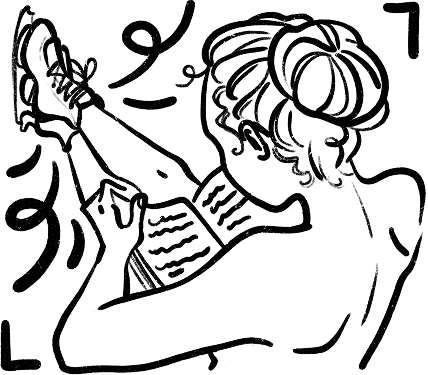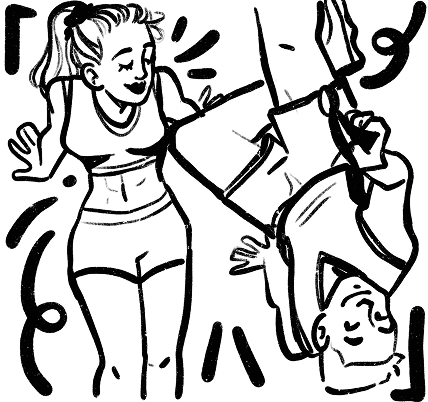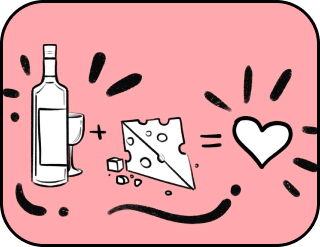Category: Materialization technologies
Is There Sex After Sports? The Slippery Nuances of the Olympics
“The Olympic Village is the only place on Earth where you can win gold and lose your mind in one night”
Anonymous participant of the 2016 Olympic Games
Athletes. Powerful, toned bodies. Muscles rippling under glistening skin. Sportswear accentuating seductive curves. Tempted to strip it all away right now?
We’re not — because the realities of the Olympic Games and athletes’ actual lives are far from the glossy images. The era of Iron Arnie is long gone — and for Olympians, it never even began. Cutting weight and getting shredded? Ugh, leave that to housewives — they’re the real pros at shredding… lettuce.
Half of all sports don’t require chiseled bodies with pronounced delts and traps. In fact, some disciplines need a bit of fat under the skin to perform optimally.
Let’s leave bodies aside and talk about emotions. A gathering of athletes always comes with tons of restrictions: this is off-limits, that’s forbidden. And where there are rules — there’s the urge to break them. The stricter the limits, the stronger the temptation.
So — is there sex after sports? Or during sports?
The Three Titans
Statistics, biology, and… the news will lift the veil. The Rio Olympics made headlines for distributing 160,000 condoms to athletes. The Paris Games broke the record — 300,000! That’s a telling figure. Even with 30,000 participants — are the organizers expecting 15 to 25 acts per couple?
News stoked the curiosity, now it’s time for biology. Hormones, energy, monotony, and repetition — a volatile cocktail with only one outlet: sex.

Biologists note that energy expenditure during training is incredibly high. What’s worse is after the Olympics — with nowhere to burn all those calories. Sleepless nights, sex (careful — orgies possible!). The last part is just a rumor, of course. After all, the Olympic Village is like Vegas. At least in principle: what happens there, stays there.
Personal Perspectives
But biology is universal, and statistics are merciless and specific. So why not talk to real athletes?
The story of Wu Chi Fan is a classic. He once complained about his coach who forbade any meetups until after the Games. Sex? A criminal waste of calories. Better to burn them for the cause. After that, do whatever you want — especially if heavyweight Wu Chi Fan brings home another gold medal.
The takeaway: the desire is always there, but sometimes it’s a no-go.

Then there’s Alena Vertlitskaya — a famous figure skater who met her current husband at her second-to-last Olympics. She fully dedicated herself to training and believes that energy can be released in other ways — especially when your spouse is out of reach.
The moral: some people simply don’t feel the urge. But they’re rare.
Konrad Schisn doesn’t get along with his coach and isn’t married. He proudly claimed that after Rio, he had no condoms left. After Paris — just one. A souvenir. As a shooter, calorie control isn’t as crucial. What is important is peace of mind and confidence. Sex relieves stress and brings calm.
Conclusion number three: statistics won’t show the full picture.
The View from the Top
What about the coaches? Anyone preparing an athlete for the Olympics will tell you a hard truth: Sex interferes with performance — so it’s banned until after the competitions. Then? Go wild. Athletes have enough stress already. Add romance into the mix, and it’s chaos: training time gets split with partner time.
But real feelings are rare. There’s a ton of emotion and energy — which, in 99% of cases, never leads to lifelong love. Just look at the number of couples formed at the Games: two or three per Olympics.
Against 300,000 condoms — that’s peanuts.

Whether to believe what happens behind closed doors in the Olympic Village is up to you.
Maybe the athletes hype it up, telling steamy stories. Maybe the organizers fan the flames with cheeky suggestions — like the infamous cardboard beds “designed to prevent sex” that turned out to be totally unbreakable. Let’s not kid ourselves — sex is happening. And sometimes it even leads to weddings and kids. Because athletes are human too. But measuring it all with numbers? That’s one hell of a math problem.
Olympic Shifts After Midnight
During the Rio 2016 Games, security was reportedly forced to kick out several “night swimmers” from the closed Olympic Village pools. Some folks had been using the lanes for purposes other than practice — and it sure wasn’t synchronized swimming. Rumors say it got wild — actual orgies on the same spots where competitions were held during the day.
At Sochi 2014, Tinder recorded an anomalous spike in usage. Match activity inside the Olympic Village shot up by 1,850%. Athletes admitted to using Tinder to “relax before competition” — and they weren’t always talking about heartfelt chats.

According to unconfirmed reports, Jamaican sprinter Usain Bolt had his own little “chill zone” in the Village, where fans visited him late at night. He even posted a few suggestive photos and stories — which then mysteriously vanished. One video did leak: Bolt dancing in a room with three women. The public took it in stride: “If anyone can run 100 meters in 9 seconds and still party all night — it’s him.”
Moist Myths from the Olympic Village
Myth #1: During the Tokyo 2021 Games, beds were made out of cardboard to “prevent sex.”
Fact: Those beds could withstand up to 200 kg. TikTok was full of videos proving it — one athlete was jumping on the beds, another invited a friend to stress-test them together, and a third just passed out on one after a party.
Myth #2: In some conservative countries, organizers buy fewer condoms to promote discipline. In practice, this leads to athletes “borrowing” from more relaxed neighbors.
Fact: Often, it’s the opposite — organizers overstock to avoid scandals. Brazil’s famous 450,000-condom reserve included eco-friendly, recycled materials. Eco-sex in the service of sport.
Myth #3: In the 1970s, East Germany ran a secret discipline school for Olympic athletes, banning any expression of sexuality — while simultaneously developing hormone boosters that increased libido. All for the sake of victory.
Fact: East German coaches in the ’70s really did control athletes’ personal lives — banning romantic relationships and even isolating them from partners.
Meanwhile, sports labs were creating special hormone stimulants to boost endurance. But there was one spicy side effect: increased libido. To counter the passion, athletes were given experimental pills with succinic acid, which, in theory, would “cool things down” and restore focus.
It was believed that a body constantly resisting temptation would grow faster. If you couldn’t resist, you didn’t deserve a medal.
But if you could — you could lift the barbell and conquer your inner demons.

What If?
Three weeks of doing nothing but eating, stretching, training, and competing? Sexologists say the average frequency for sex is every two to three days — unless you’re over 50. And Olympic athletes that age? Rarely spotted.
That means if you go cold turkey on your sex life for three whole weeks, you could miss out on 8 to 10 sexual encounters. Or masturbation sessions — but that’s not the point.

Every system in the human body functions in its usual rhythm. If that rhythm is suddenly disrupted, things can get uncomfortable — even painful or inflammatory. Go all in on sex after two months without it? You’ll feel it. Go three weeks without? Same story.
So while coaches are focused solely on performance, sexologists argue: calories spent on pleasure are still calories well spent. You just have to recalibrate. Maybe not every other day, but on a schedule that works for your new reality.
Survival Guide for a Touchless Life
Olympians know: real strength begins with self-control. Even if you’re not an Olympian, but life is demanding an Olympic-level abstinence from you — this plan will help you reach the finish line with pride. Maybe you’re not running a marathon, but making it through 21 days without sex is still a feat worthy of a medal. Or at least a proud pat on the back.
Here’s your abstinence survival checklist — compiled from observations, complaints, scientific facts, and stories of athletes who ended up forming emotional bonds with inanimate objects… just to get some kind of physical contact.
Let’s go. Chin up. And keep those hands to yourself.
Day 1–3:
Convince yourself that you are a heartless, fearless machine. Let your six-pack be your support system.
Day 4–7:
Channel your sexual tension into rituals: scrub your sneakers with a toothbrush, count every grain of protein powder in a teaspoon, make a ball out of toilet paper. It’s more meditative than it sounds.
Day 8–12:
Level up to philosophical. Look at other athletes and repeat your mantra: “This is not lust. This is aesthetic admiration of the human form.”
Day 13–17:
Start a notebook. In moments of heightened desire, write down respectable thoughts:
“An orgasm is temporary, but a medal is forever.”
“I may not have sex, but I’ve got flexibility.”
Day 18–20:
Find a friend. Not for pleasure. Just for comfort.
Hug them. It helps with hormonal regulation. Just don’t overdo it — or you might break the streak.
Day 21:
You made it. You reached enlightenment. You’ve earned your medal for endurance.
And maybe… someone’s already waiting for you in the hallway — holding a long-awaited condom and a ticket home.
Tip from an Olympic Sexologist:
“Sex is like a warm-up: if you haven’t done it in a while and jump in too hard — you’ll pull something. Be smart about it. Ideally, with a calendar and some cramp cream”
Summing Up the Extremes
While the world obsesses over medals, doping scandals, and mental toughness, you now know the real battle is the one behind closed doors — between hormones and the training schedule.
Athletes, stay strong. Readers, take notes.
And we’ll just be here, watching from the sidelines, scribbling in our abstinence journals: “It’s not about winning. It’s about making sure the bed doesn’t squeak during the live broadcast.”
We’ve ventured beyond the boundaries of time and space. By the way, it’s empty there.
Thank you!




